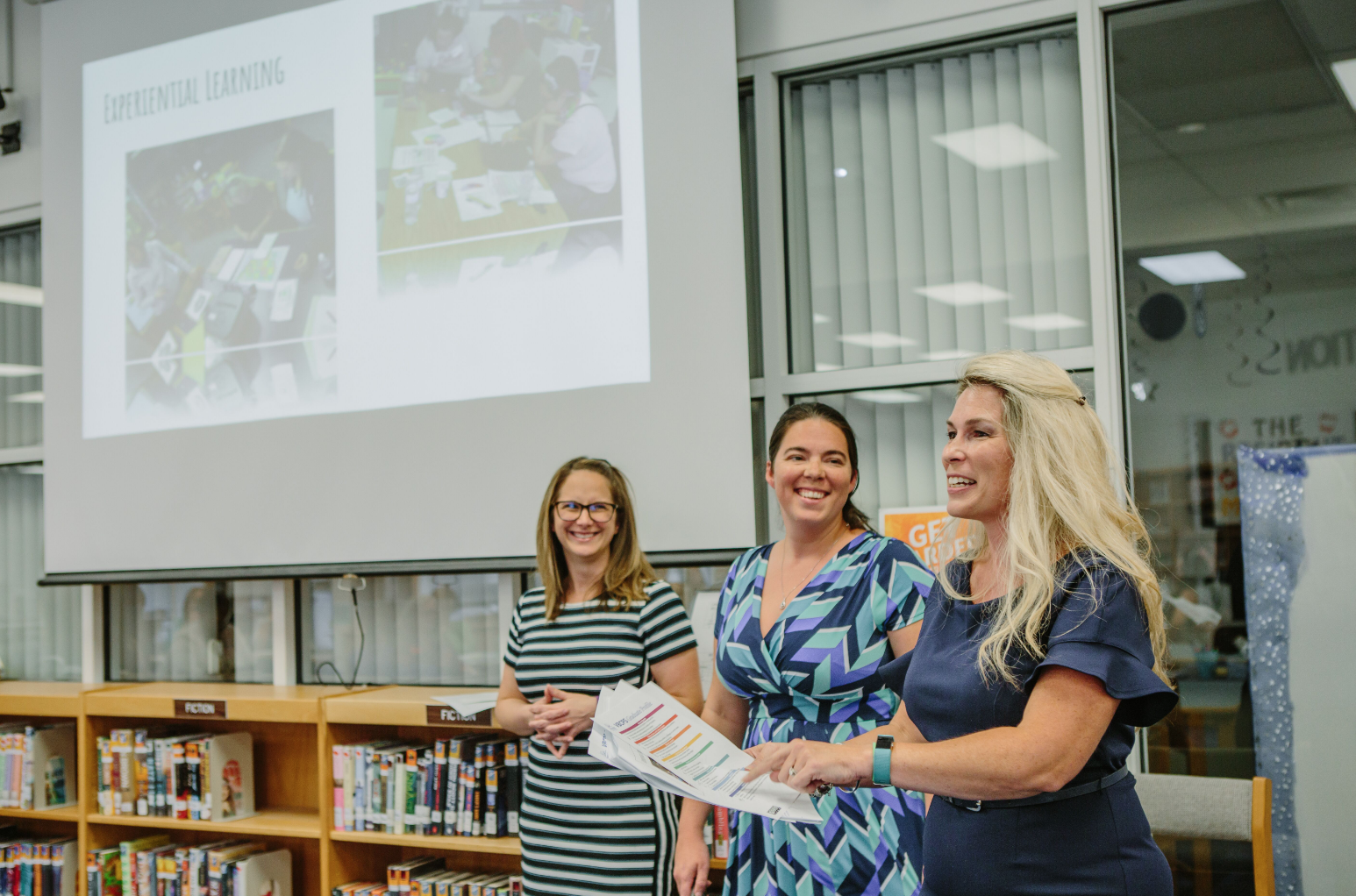Michelle Burton, Gifted Resource Teacher, Holland Elementary
Michelle Burton, along with her teammates Elizabeth Merce and Amy Mallison, discuss the experiential learning happening in VBCPS classrooms.
Can you explain your prototype?
Our thinking was that one reason people didn’t understand, or are not on board with transformational mindset, is because they didn’t understand it. Our idea was if we expose people to it and engage them in this transformational learning that their kids are experiencing, they would be more on board and excited about what they are doing in the schools. Our idea, [of transformational learning walks], was not just have parents come in and shadow their kids; we wanted them to really engage with what is happening and talk about why teachers and students are making different choices in the classroom. As teachers, we explain a lot of what we’re doing, and I always assume the hows and whys were obvious, but they were not always obvious for the families. This is why we’re letting kids sit on a bouncy ball, or why we’re doing digital breakouts; and this is what you did in your school and this is what we’re doing now and let’s talk about it. We prepped them for the learning walk and told them we wanted them to look for meaningful uses of technology, student choice in the classroom, student-centered activities, and just how was it different from when they were in school. We let them walk around and look at what the kiddos were doing, and then they had an opportunity to reflect on those things. My group had a lot of questions: if everything is in small groups, how do they know what’s going on? Why is there so much small group work? And so on. [VBCPS] has the graduate profile, so we went over that, even starting in the elementary school, we want to be focused on this profile of the graduate. A lot of this whole experience is that the community is being educated and being exposed to the why of what we’re doing.
VBCPS Graduate Profile sets the course for what students should know and be able to do when they leave Virginia Beach schools. Michelle and her colleagues shared the details of the graduate profile with parents who came to their learning walk prototype.
What has been most meaningful for you in this process?
I am a total, “Let’s come up with an answer, let’s go with it, only doing parts of it is still a success” person. I have done the prototype four times: I had one parent come, then another parent come, then three come. We got so much out of these itty-bitty prototypes and that’s OK, it’s not all or nothing. It isn’t a failure because it’s not big — we can learn from these little chunks.
How is this work different from what you expected?
I think that educators complain a lot about problems in education and we’re not often given the chance to actually try and solve any of them. We try to solve them small scale in our own classrooms, but I don’t think we’re often given a chance to think big scale with outside groups. How do we solve these big issues in education? I don’t like people that complain and don’t attempt to solve the problem, so it was exciting to be given an opportunity to solve real issues in education.
I guess I expected the process would move a lot faster than it did. I wanted to see this all played out, so I don’t really feel like we’re done. We’re not done...we need more time! I wanted everything packaged in a nice neat box; I thought the process would be further along, but I also didn’t really know what the process would be like — and look at what amazing thing we did accomplish. [But now as the work is wrapping up] I have shifted because I’m like, it’s okay. I have been attempting to see that…it doesn’t have to be a huge shift. It can be small.
How has your definition of innovation shifted?
Innovation can look totally different in different places, so it doesn’t have to be huge things to be considered innovative; it can be small changes that have big impact, or even small changes that have small impact. Doing original things, doing new things, doing advanced things to make a change…but it doesn’t have to change the whole world. We brought in five parents this year. Yeah, we want to bring in more and make it bigger, but I have done something that hasn’t been done at my school yet, and I had a conversation that hadn’t happened before, and that’s still innovative. I am a big-picture person and bringing it down is a good thing.


